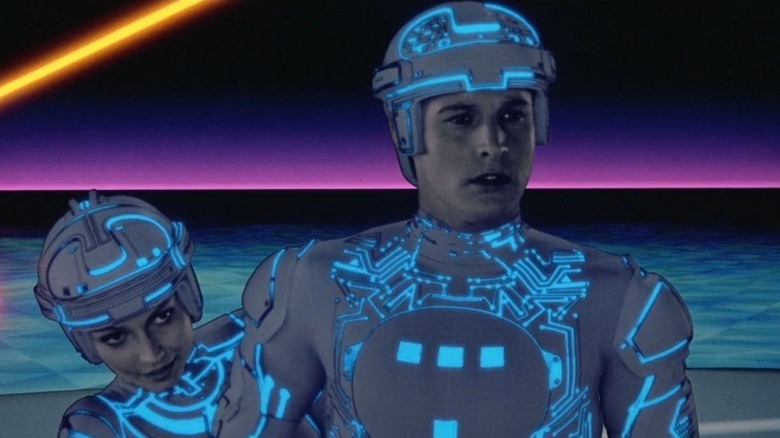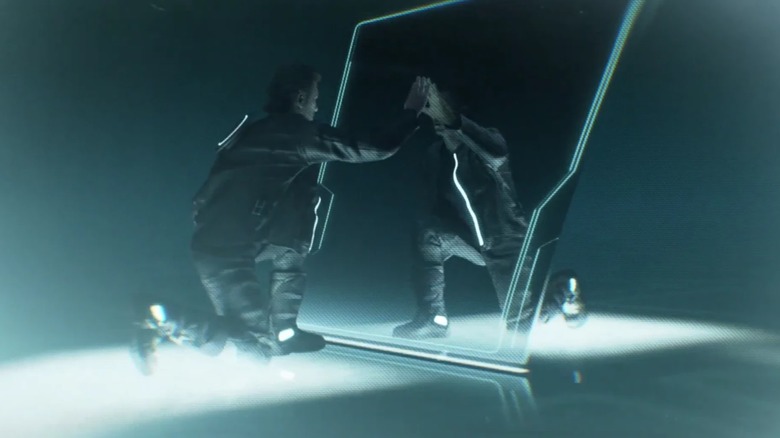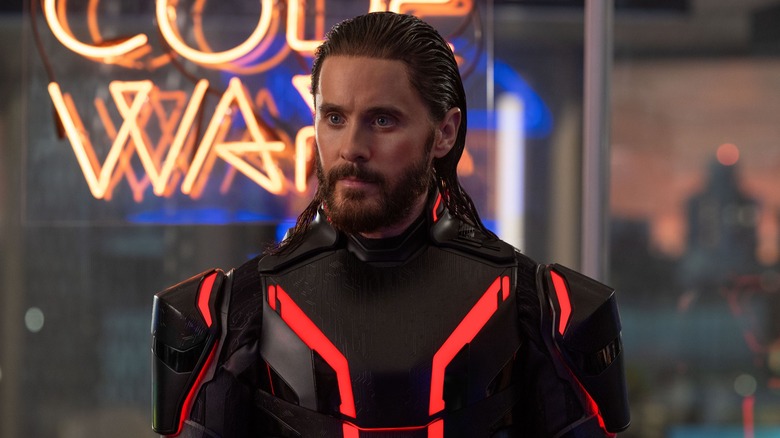Tron's Creator Thinks The Original Disney Movie Got One Thing Very Wrong
This post contains spoilers for 1982's "Tron" and its sequel, "Tron: Legacy."
Steven Lisberger's "Tron" permanently altered the relationship between digital technology and filmmaking. It was one of the earliest films to extensively use CGI for multiple sequences (a practice that has currently evolved into an expected standard that we take for granted) and one of the first to take a multipronged approach to artificial intelligence. In the film, ENCOM's Master Control Program (MCP) expands into a sentient virtual consciousness, and this cyberspace is rendered in sharp, angular, neon-tinted shades that look rather sparse (and one-dimensional) by today's standards.
In hindsight, the film's visual identity feels uniquely retrofuturist, anticipating a future where technology would become inseparable from personal identity. Moreover, the aesthetic in "Tron" was so distinct during the time of release that it served as a blueprint for similar concepts explored in genre entries over the years. The natural culmination of these evolving ideas was "Tron: Legacy," a visually enhanced, thematically grander sequel that deserves more attention than it currently enjoys.
The storyline in "Tron," however, is surprisingly optimistic about AI and its relationship with humanity, partly because the concept of high-functioning digital algorithms was still an aspirational quasi-reality in 1982. While the catalyst for conflict is a rogue AI, Flynn (Jeff Bridges) and his friends are saved by the titular program, Tron, who rebels against the rogue programs to free his kind. In anticipation of "Tron: Ares," Lisberger had the following to say about this "naive" but hopeful perspective in the October 2025 issue of SFX Magazine:
"We were very naive back then and so optimistic, but it felt different [...] It was a wonderful opportunity and the tools were so amazing [...] [Now] I hear people are shocked that AI is hallucinating and making mistakes. That's a blessing. It's quite charming. I will be much more scared if someone tells me AI never makes mistakes. That's when the real problem starts. I like to say that it's imperative that we, as an artistic community, kick this technology around before it kicks us around. I'm weary of hearing all the dreary and apocalyptic predictions of the future of technology."
Lisberger seems to be advocating for a more responsible, level-headed use of a tool that was never meant to dictate or control our lives (or, frankly, delude us into believing it can mimic the complex spectrum of human skill and artistry). How does "Tron: Ares" plan to tackle these subjects, and what stance does its predecessors take? Let's investigate.
The Tron movies have always presented technology as a reflection of humanity
Per Lisberger, any piece of technology, including AI, is supposed to be a mirror to us, so how it manifests in the future is in our hands. He describes it as a parent-child relationship, where we, the creators of said technology, need to take on the role of the responsible adult, as our behavior is going to be mimicked and built upon by an algorithm that is constantly growing. "So the question is, regarding AI, who's going to be the adult in this relationship? Because I look at the world and I have a longing for a more adult attitude, particularly in America these days," Lisberger states, urging the artistic community to make use of AI with discernment, as it is an imperfect tool that will make mistakes. The goal isn't to replace or simulate human ingenuity, but to use technological tools to heighten what already exists in the artistic process.
"Tron" sports a relatively simplistic take on the sentient cyberspace, where a rogue program rejects users and establishes its own autocracy inside the Grid. With the arrival of users, this status quo is shattered, and the disenfranchised programs side with Flynn and co., with Tron (the digital alter ego of a user) spearheading their efforts to free entrapped programs and eliminate the corrupt MCP.
This is akin to purging a virus that infects the system and prevents programs from carrying out their intended function — only this time, an infected program helps the user by fighting back to eliminate the corruption. There is an endearing charm to this concept, as "Tron" views technology as a friend, where its unsavory aspects can be counteracted with bravery and the power of friendship. It fails to factor in human hubris or foolishness, taking a more idealistic approach to any conflicts that might arise.
"Tron: Legacy" is more nuanced in its approach to the new cyberspace, as the rogue AI that rules it, CLU (Bridges), is an identical replica of Flynn. CLU doesn't merely resemble Flynn, but also amplifies his worst impulses, which manifest in the form of treachery, control, and an inflated sense of self. His maker, Flynn, grapples with his own limitations throughout the film, including his inability to face his son Sam (Garrett Hedlund), who unwittingly inherits the cyberspace. This time, the threat is dire: CLU intends to break out into the real world, as he wants to infect everything, take over the realm of users, and flip the status quo in his favor. "Tron: Legacy" understands the risk of unchecked human ambition, as Flynn's failures as a creator influence and shape the worst impulses in CLU, his digital mirror.
Tron: Ares will shatter the established status quo of the Tron movies for a good reason
Details about "Tron: Ares" are sparse, but its logline indicates that the story will follow Ares (Jared Leto), a highly sophisticated program that has been sent out into the real world on "a dangerous mission." There's zero reason to assume that Ares' motivations are benevolent, or that his presence as a fully sentient AI in the real world won't have horrific repercussions.
You might remember that Quorra (Olivia Wilde) had also stepped into the real world at the end of "Tron: Legacy," but this miraculous feat was made possible due to her unique physiognomy as an ISO. Moreover, the difference between Quorra and Ares breaking digital confinement is intent — while the former loves and treasures the human experience, the latter's perspective is a blank slate, which is all the more reason to err on the side of caution.
Lisberger (who serves as a producer for the upcoming film) also spoke to Polygon to shed some light on the themes that "Tron: Ares" is expected to tackle, including the possible limitations of AI, its evolving reaction to its creators, and whether such unchecked technology can be contained:
"We live in a world where we have to recognize a lot of limitations on ourselves. Now we're creating AI — an entity that potentially has no limitations. Do we really want to do that? Do we want to have a version of ourselves and how we think with no limitations? This entity does not have these limitations, and we're jealous of its ability to think, but perhaps the AI will be jealous of our physicality. Are we going to be the parent to the AI, or is the AI going to start treating us like children? One of us is going to have to be dominant."
Hopefully, the film will tackle these difficult but essential questions in unambiguous ways, while bringing the ideas that "Tron" has always championed full circle.
"Tron: Ares" is set to be released in theaters on October 10, 2025.


